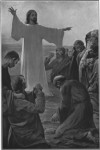From Luke 17-18
 Through our passage today there is an undercurrent of teachings which seek to humble those who serve Jesus. Having worked for the LORD, when you come into his presence how will you expect to be treated?
Through our passage today there is an undercurrent of teachings which seek to humble those who serve Jesus. Having worked for the LORD, when you come into his presence how will you expect to be treated?
This post is part of my bible in a year series.
Passage and Comments
Still speaking to his disciples, Jesus told the parable of the rich man and Lazarus. The parable speaks of the rich mans failure to repent from his worship of worldly wealth and his current suffering in Hades. In our passage today Jesus continues speaking about sin and its consequences.
17 And he said to his disciples, “Temptations to sin are sure to come, but woe to the one through whom they come! 2 It would be better for him if a millstone were hung around his neck and he were cast into the sea than that he should cause one of these little ones to sin. (Lk 17.1-2)
‘Temptations to sin are sure to come’. Jesus warns his disciples against leading others into sin. He recognises in this world they will be constantly bombarded with temptations.
‘It would be better for him’. But these temptations for the most part come from people. Jesus condemns those people through whom the temptations come. They will receive a punishment far worse than drowning than those who sin themselves.
What are the most common temptations to sin you meet? Are you leading others into sin?
Jesus instructs his disciples directly.
3 Pay attention to yourselves! If your brother sins, rebuke him, and if he repents, forgive him, 4 and if he sins against you seven times in the day, and turns to you seven times, saying, ‘I repent,’ you must forgive him.” (Lk 17.3-4)
‘Rebuke him’. The disciples are instructed to rebuke those who sin and call it out. This can be hard. If the person repents (‘turns to you’) they must forgive him. Let him go without punishment.
‘Seven times in the day and turns to you seven times’. Seven represents completeness, perfection. Jesus teaches the disciples to forgive every single time they repent. His teaching is reflected in the way God forgives sin.
God always forgives those who repent of their sins and trust in him.
The disciples realise this will be difficult to do. Below they are called ‘apostles’. Since they were sent out by Jesus, the term applies.
5 The apostles said to the Lord, “Increase our faith!” 6 And the Lord said, “If you had faith like a grain of mustard seed, you could say to this mulberry tree, ‘Be uprooted and planted in the sea,’ and it would obey you. (Lk 17.5-6)
‘Increase our faith’. The apostles recognise their need for greater faith. They want more so they can repeatedly forgive as Jesus instructed them.
 ‘Mustard grain’. Jesus responds implying they have little to no faith. Even a little amount of faith can move big trees. The faith that forgives people who repent can also move big trees.
‘Mustard grain’. Jesus responds implying they have little to no faith. Even a little amount of faith can move big trees. The faith that forgives people who repent can also move big trees.
Jesus rebukes the apostles for their lack of faith. He would probably rebuke us as well.
‘It would obey you’. When God speaks his will is implemented. Jesus recognises the power of speech and amazingly implies creation is listening to what God’s people say. Creation will also obey those with sufficient faith.
7 “Will any one of you who has a servant plowing or keeping sheep say to him when he has come in from the field, ‘Come at once and recline at table’? 8 Will he not rather say to him, ‘Prepare supper for me, and dress properly, and serve me while I eat and drink, and afterward you will eat and drink’? 9 Does he thank the servant because he did what was commanded? 10 So you also, when you have done all that you were commanded, say, ‘We are unworthy servants; we have only done what was our duty.’ ” (Lk 17.7-10)
 ‘Come in from the field’. The disciples and many others are serving the LORD. Perhaps in serving the LORD the disciples will at times become proud. Proud of what they have done for the LORD and as a result think they deserve something more.
‘Come in from the field’. The disciples and many others are serving the LORD. Perhaps in serving the LORD the disciples will at times become proud. Proud of what they have done for the LORD and as a result think they deserve something more.
‘Prepare supper for me’. Jesus responds the LORD will not give them equal standing, rather he will put them to more work. This is what is expected of servants. To serve their master. The servants serve their master so He can eat and drink.
‘Afterward you will eat and drink’. Only once the master is served and satisfied will the servants be allowed to eat. Jesus highlights the authority of the master over his servants.
‘Does he thank them?’, ‘We are unworthy servants’. The master will not thank them because they had done nothing beyond what was expected of servants. The servants recognise the fact.
About Jesus
In several other passages Jesus does say servants will be commended for their fruitful labour. ‘Well done good and faithful servant’ he will say (Mt 25.21,23; Lk 19.17). He gives rewards to those who serve him (See this word study on reward). He says those who are considered worthy attain to the end of the age (Lk 20.35).
The last section we looked at above is better understood by interpreting it along side these others regarding fruitful service, reward and worthiness.
God treats us as his servants with grace and mercy. He does call people good and faithful. He does reward those who serve him. But we should never expect this as our due. Rather an outworking of his generous character.
We need to appropriately respond to his grace and mercy.
The appropriate response to God is to recognise his worth and authority is far beyond ours. In every way humbling themselves before him.
Copyright © Joshua Washington and thescripturesays, 2016. All Rights Reserved.


